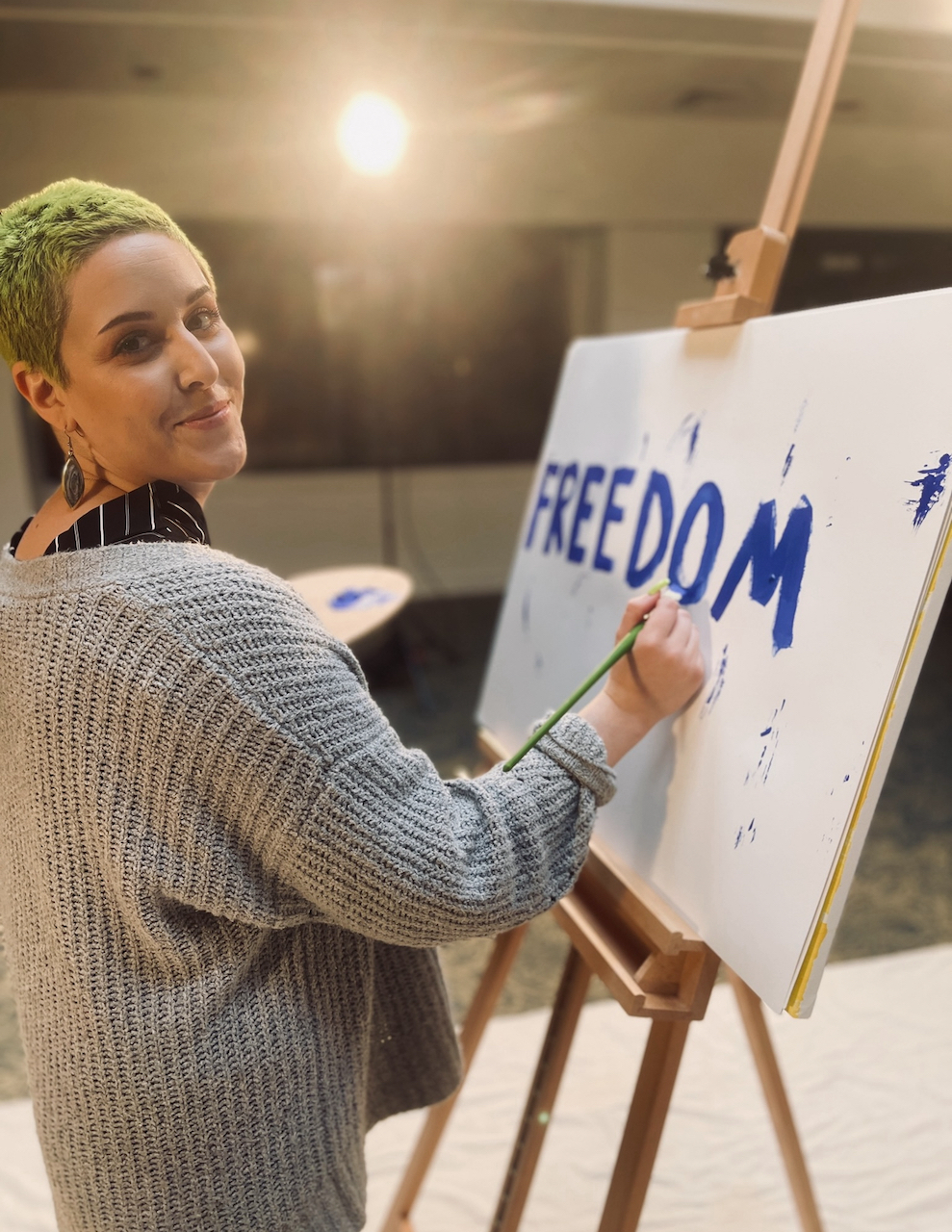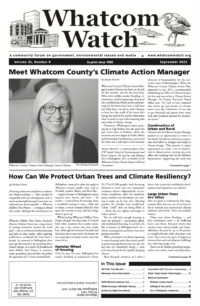by Brylie Taylor
I remember exactly where I was the very first instance I had a panic attack. I was 17, standing directly outside the door of my afternoon English class. My school counselor was talking to me about my lack of presence on a project that would not allow me to graduate if I didn’t complete — and, as soon as the conversation had begun, I felt myself getting hot. Sweat began to pool on my lower back all the way down to between my toes in my sandals. Then I couldn’t breathe. My chest was heaving, and I physically could not take a breath. My counselor at the time pulled me aside and brought me into her office. I spent the next 10 minutes trying to just breathe.
When I calmed my nervous system enough, I became unfortunately hyperaware of the discomfort I caused folks around me and recoiled in embarrassment. My counselor assured me that there was nothing to be ashamed of and asked if I had support, such as a therapist. I had let her know that, while I had some mediocre support from my immediate family, I didn’t have anyone to truly share the depths of the challenges I was going through and had been experiencing for some time. She put her hand on my shoulder and asked what she could do for me and thus began my journey into recovery for my mental health.
The beginning stages of recovery looked like unpacking trauma, understanding my symptoms, trying different treatments, and building a care team. Years of ups and downs persisted; however, between countless medications tried, two different psychiatric stays at the hospital, relapses with substance use disorder, and never actually facing my trauma head on, I was on a path of destruction rather than rebirth. Finishing my college degree at this point seemed beyond my reach. However, with the right support, I decided to go back to Western Washington University (WWU) to get my Human Services degree. I was looking at getting my education in something I truly felt passionate about, and, because of the trials and tribulations both my family and I faced in the mental health care system, I began to wonder what type of career that would entail.
Local Affiliate
The Human Service Program at WWU requires 240 internship hours at an organization of our choosing, and I began my research by talking to friends and other folks in the program which in turn led me to NAMI Whatcom. NAMI Whatcom is the local affiliate of the National Alliance on Mental Illness, the nation’s largest grassroots mental health organization. They are dedicated to building better lives for the millions of Americans and their loved ones, who are affected by mental health.
I reached out to the folks at the organization and immediately heard a response back! For the first time in my life, I was excited about my future and its prospects. Here was an organization that aligned with the work I wanted to do in the community, and I felt gifted the opportunity to do something with my experience. When I first began at the organization, I was determined to learn the foundations of the work they did and what working in an office looked like. What began as an internship experience turned life-changing, however, in the span of a few short months.
I was open about my mental health conditions and challenges when first applying for the internship, something I never did in the past with previous employment. I never wanted folks to know what was really going on because of the shame I felt. This time, as I filled out the application, I felt the need to be honest and upfront. What this ended up doing was letting our program coordinator know that I had peer experience. This opened doors for me to become trained in a variety of different programs, support groups, and classes that NAMI offers. In these varying services, I found community. Folks could trust me because I was a peer. I was in the trenches with them instead of above them. I saw Whatcom County for the first time in a truly magical, communal sense.

Brylie Taylor paints a word for the One Word, One Story campaign done by NAMI Whatcom with help of Robert Walker of Dream Roots Creative.
photo: Amanda Pedrelli-Schuler for L61 and Dream Roots Creative
First Full-Time Employee
As time went on, I took over as NAMI Whatcom’s peer program coordinator and social media specialist. Not only did I manifest a job, but I also became the first full-time employee the organization had ever had since its incorporation in 1984. I continue to do this work because I not only care about my community, but I also have deep ties to mental health with my own journey. I will continue to do this work not because I want to but because I need to. This work is deeply important in grounding me in healing and recovery as well.
NAMI Whatcom and I work diligently to provide free resources to the community and will continue to do so as the need for these services grows. Our programs may not be a replacement for clinical therapy; however, what we do can be therapeutic. Just having family members come to Family Support Group and chat with other folks about what they are going through or any advice that helped them in their loved one’s recovery, can be life-changing for people. When there are already so many barriers to care in this county between provider shortages, costs, and more, having free support or someone to even call to address the needs they may be having, can completely change the trajectory of one’s life.
We are a volunteer organization, so the amount of work that we do for our community can only be accomplished with the help from various community members who have a passion and drive to end the stigma surrounding mental health once and for all. For more information about how you can get involved with NAMI Whatcom and the community, reach out to namiadmin@namiwhatcom.org or call our office today at 360-671-4950.
I am so grateful to have found NAMI and my community, and it is my goal to create that space for everyone in Whatcom County as well. Mental health involves everyone and together we can make a difference to end the stigma and make our experience on this earth a wonderful one.
NAMI Whatcom Programs
Some of the many programs NAMI Whatcom offers the community include:
Family Support Group: A support group for family members, loved ones, partners, and siblings, 18 and over of those who have mental health conditions.
Connections Recovery Support Group: A support group for folks 18 and over who have a mental health condition.
Dual Diagnosis: Connections Group: for folks 18 and over who have a mental health condition and challenges with substance use disorder.
Ending the Silence: A 50-minute presentation for students, families, and/or staff that combines mental health statistics and facts with a young adult’s perspective of what it was like growing up with a mental health condition.
In Our Own Voice: A 50-minute presentation for folks that combines two adults’ stories about their mental health recovery with videos from real people about their own experiences.
Compartiendo Esperanza: Our Spanish speaking outreach program and presentation.
Peer-to-Peer: An 8-week class for folks 18 and over who have a mental health condition. The class touches on coping strategies, treatment options, and advocacy tips, in a class setting with other peers.
Family-to-Family: An 8-week class for folks 18 and over who are loved ones of those that have a mental health condition. They touch on coping strategies, self-care, how to partner with your loved one and more in a class setting with other family members.
NAMI Basics: A similar model to Family-to-Family with an emphasis on young children who may be having behavorial struggles in school.
We also have the “Survivors of Suicide Loss Group” and the “Depression and Bipolar Support Alliance Group” that meet in our offices once a month. Not to mention the various education forums and events we do in the community as well.
_____________________
Brylie Taylor is the Peer Program Coordinator and Social Media Specialist for the Whatcom County Affiliate of the National Alliance on Mental Illness. They have been involved with NAMI for a few years now, but have experienced mental health conditions from a young age. Because of their unique challenges growing up, they were inspired to increase awareness about the effect of mental health conditions on folks and their families and will continue to do so until mental health is destigmatized.





























